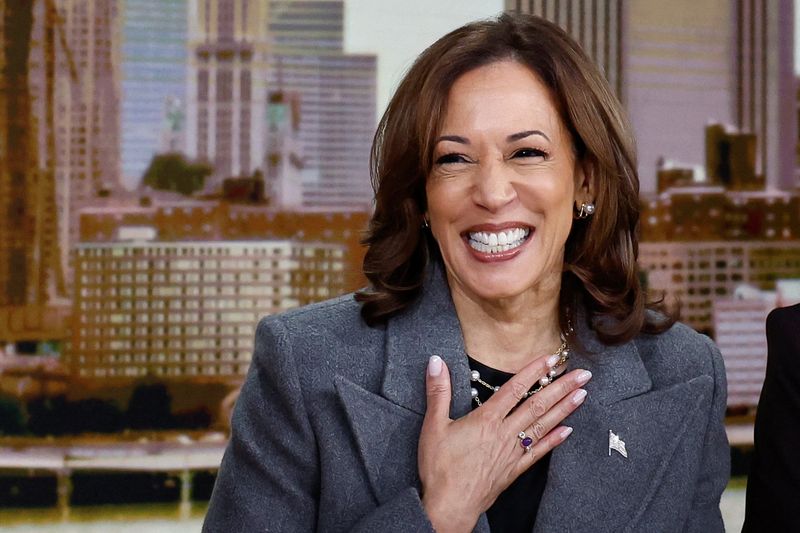By Makailah Gause and Pete Schroeder
WASHINGTON (Reuters) - A crackdown by the U.S. consumer finance watchdog on hidden or excessive financial fees could expand to target billions of dollars in mortgage, credit reporting and other fees if Vice President Kamala Harris wins the presidential election.
Expunging "junk fees" has been a central, and popular, plank of Democratic President Joe Biden's push to bring down prices. And with inflation and the economy at the heart of the presidential race, Democratic candidate Harris has pledged to carry on the fight.
Rohit Chopra, director of the U.S. Consumer Financial Protection Bureau under Biden, has targeted around $20 billion of annual bank overdraft, credit card and bounced-check fees, according to the agency's data. But there are billions of dollars of other fees the agency could go after with four more years of Democratic leadership. Chopra's term ends in 2026.
According to a CFPB official and a second regulatory source, the CFPB's next top targets include mortgage closing costs and business-to-business fees that trickle down to customers, in particular borrower credit-score fees.
While there is no publicly available data on the total annual value of these fees, a Reuters analysis of CFPB and other data suggests they could exceed $24 billion.
"Harris would be wise to continue to focus on junk fees ... as vice president she's observed the success first-hand," said Aaron Klein, senior fellow at the Brookings Institution think tank.
The CFPB says the financial system is riddled with fees that are not disclosed up front or which are excessive and distort the free-market system by concealing the true price of goods and services.
Banks say the fees are transparent and that eliminating them will hinder Americans' access to credit. They have sued to overturn the CFPB's March rule capping credit card late fees at $8, down from the typical $32.
"U.S. consumers don't want new regulations that make it more expensive to use their credit cards and other banking products," said Bill Hulse, senior vice president at the U.S. Chamber of Commerce which is leading the credit card litigation. He said the group would continue to advocate on fees.
That is not deterring the CFPB, which expects to finalize curbs on overdraft and bounced-check fees by year-end, after which mortgage closing costs are its next top target, said a CFPB official who requested anonymity to discuss the agency's plans.
The CFPB this year flagged that closing costs, which comprise dozens of individual fees, are a barrier to affordable housing and may merit regulatory action.
Median total loan costs in 2022 rose more than 20% year-on-year to reach nearly $6,000 for home purchase loans and $5,000 for refinancings, according to CFPB data. That suggests borrowers spent roughly $24 billion on closing costs last year, based on the 4.2 million homes that were purchased and refinanced, according to Mortgage Bankers Association data.
The CFPB flagged that title insurance, which typically costs 0.5% to 1% of the purchase price, is among the most expensive components of closing costs.
It also said that mortgage lenders have reported that the fees they pay for borrower credit reports and scores, which can exceed $100 and are ultimately passed on to borrowers, have jumped since 2022, sometimes by as much as 400%.
That is also a key focus for the CFPB, both sources said. The second source added that these types of big-business-to-small-business information fees were generally on the agency's radar.
The CFPB has also been cracking down on fees lenders charge customers for information about their accounts on items such as outstanding loan balances or fraud inquiries, its website says. It has also called out ATM fees and the fees charged by retailers for cash back in stores.
"If Democrats win, you're going to see continued pressure on all types of fees," said Isaac Boltansky, director of policy research at brokerage BTIG.
PUSHBACK
CFPB officials believe the agency has the authority to cap fees, but firms dispute that and have signaled they will fight more curbs. In an August letter, lenders and title insurers warned that they believe Congress did not give the CFPB power to set fees in the mortgage-origination process.
Congressional Republicans have also criticized the CFPB's Chopra for what they see as overreaching. Analysts believe that if Republican candidate Donald Trump wins, the agency would pull back.
Some executives, though, worry that a recent pledge by Trump to cap credit card interest rates indicates that if he wins the election, the CFPB may be tougher on lenders than during his first presidency from 2017 to 2021.

Whoever wins the election, the Consumer Bankers Association, which represents major retail lenders, has already launched a campaign that pushes back on the "junk fee" narrative.
"What we don't want to see repeated is this administration's campaign against banks," said Lindsey Johnson, the group's CEO, referring to the Biden administration. "Whoever wins, the banks need to be at the table, participating in the discussion."